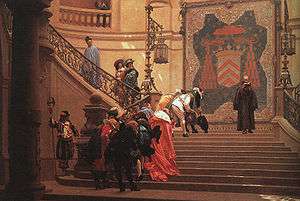Éminence grise

An éminence grise (French: [eminɑ̃s ɡʁiz], grey eminence) is a powerful decision-maker or advisor who operates "behind the scenes" or in a non-public or unofficial capacity.
Origin
This phrase originally referred to François Leclerc du Tremblay, the right-hand man of Cardinal Richelieu. Leclerc was a Capuchin friar who was renowned for his beige robe attire (as beige was termed "grey" in that era.) The title His Eminence is used to address or refer to a Cardinal in the Roman Catholic Church.[1] Although Leclerc never achieved the rank of Cardinal, those around him addressed him as such in deference to the considerable influence this "grey" friar held over "His Eminence the Cardinal".[2]
Leclerc is popularly referred to in several works. Aldous Huxley wrote an English biography of Leclerc entitled Grey Eminence. There is also an 1873 painting by Jean-Léon Gérôme, L'Éminence Grise, which depicts him descending the grand staircase of the Palais Cardinal. Leclerc is referred to in Alexandre Dumas' The Three Musketeers as the character Father Joseph, a powerful associate of Richelieu and one to be feared.
Historical examples

- Stańczyk was a Polish jester renowned for his great intelligence and political insight.
- Lord Esher was an English adviser during the First World War who had the confidence of King Edward VII and King George V
- Sir Horace John Wilson, an advisor to Neville Chamberlain, was an architect of the pre-World War strategy of containment.
- Deng Xiaoping was the de facto highest leader of China 1978-1989. Despite being neither General Secretary of the Communist Party nor President of the People's Republic. Deng was officially an "advisor" to the regime during 1982-1992, yet his actual power extended back into the Hua Guofeng period, but was cut short after the Tian'anmen Incident.
- Dick Cheney, Vice-President of George W. Bush, was viewed as an eminence grise, an "intellectual godfather" of the administration's attempted expansion of presidential powers and its aggressive foreign policy, as well as its perceived Machiavellian view of the world.[3] Said Lawrence Wilkerson, a Cheney critic and one-time chief of staff to Secretary of State Colin Powell: "The power behind the throne — an eminence grise — that's what Dick Cheney has become. The real president of the United States is Dick Cheney."[3] Other common candidates for the title of éminence grise in American political life over the decades have included Edward M. House, Harry Hopkins, Bernard Baruch, Clark Clifford, Robert Strauss, Ted Sorenson, McGeorge Bundy, and James Baker. Andrew W. Marshall, the noted strategist for the Office of Net Assessment, has been described as a Grey Eminence.
In popular culture
The strict and unforgiving political advisors in Yes, Minister and The Thick of It have some similarities with the classic character.
Marquis de Carabas has this function in the realm of Neverwhere.
In the game Crusader Kings II, the "Grey Eminence" trait grants a character a high bonus to diplomatic ability.
See also
| Look up éminence grise in Wiktionary, the free dictionary. |
References
- ↑ Historical reference to address in the Roman Catholic Church
- ↑ Mould, Michael (2011). The Routledge Dictionary of Cultural References in Modern French. New York: Taylor & Francis. p. 149. ISBN 978-1-136-82573-6. Retrieved 15 June 2012.
- 1 2 Walsh, Kenneth T. (January 23, 2006). "The Cheney Factor: How the scars of public life shaped the vice president's unyielding view of executive power". U.S. News & World Report. Archived from the original on January 17, 2006.
www.stejlfart.com
- O'Connell, D.P. (1968). Richelieu. New York: The World Publishing Company.